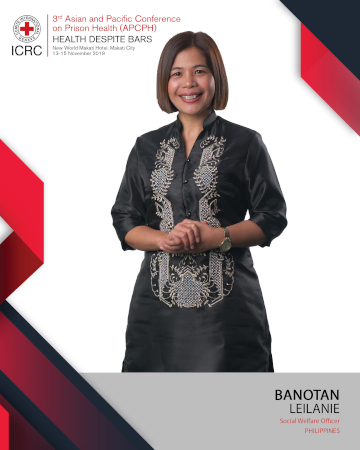
Leilani M. Banotan
Presentation: Disability-inclusive Health Policy Development in JailsTime: 10:45 – 11:30
Leilani M. Banotan is Social Welfare Officer III of the Bureau of Jail Management and Penology, National Headquarters, Philippines. She has a master’s degree in Social Work and Government Management and started her career as a social worker in an NGO. Banotan eventually took on the role of a medical social worker in a government hospital. She has attended various local and international rehabilitation-related training programmes on risk assessment of violent offenders, human rights, mental health and psychosocial support and therapeutic community management.
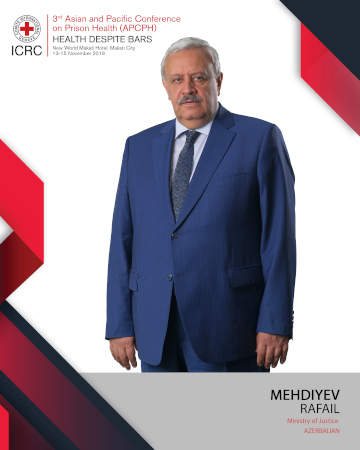
Dr Rafael Mehdiyev
Presentation: Effective Collaboration of Prison Medical Services and Prison Administration in the Frame of TB Control Programme and BeyondTime: 11:30 – 12:15
Dr Rafael Mehdiyev is the head of the Main Medical Department of the Ministry of Justice of Azerbaijan since 2007. Holding a Ph.D. in medicine from the Azerbaijan State Medical Institute, Dr Mehdiyev leads the Azerbaijan TB Control in Prisons Programme, which is internationally accepted as a centre of excellence for programmatic management of drug-resistant TB among prisoners. He has also been working for Azerbaijan State Medical Institute as an associate professor with the Department of Surgical Diseases since 1994. From 1980-1992 Dr Mehdiyev was engaged in scientific-pedagogical activities and served as deputy head of the Health Department of Baku from 1993-1994. He also has more than 10 years’ experience as head doctor. Dr Mehdiyev has authored more than 100 articles. The outcomes of about 40 of his scientific hypotheses have been presented at international conferences and published in foreign journals. In 2006, he received the title of “Honored Doctor”. Recipient of several other special ranks and medals, Dr Mehdiyev was also presented the “Correctional Health Care Award” by the International Corrections and Prisons Association for Organization of Medical Services in Prisons, USA.
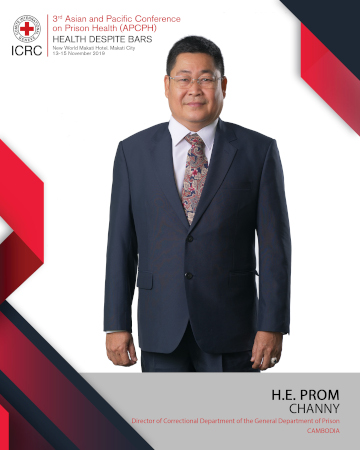
Channy Prom
Presentation: Cambodian Prison HealthTime: 13:45 – 14:30
Channy Prom is director of Correction and Rehabilitation Division at the General Department of Prisons (GDP) of the Ministry of Interior of Cambodia. He graduated from the National School of Cambodian National Police in 2000 and has a master’s degree in Development Management from Norton University. Prom also holds certificates in Managing Natural Resources Conflict from the Royal Danish Embassy (2010), Gender Equity in Practice (2010) and a Cultural, Consular, General Aspects in the Foreign Service and Schengen Cooperation (2011) from the Ministry of Foreign Affairs of Denmark and an Australian Correctional Leadership Program (ACLP) Commissioner’s Brush Farm International Scholarship in 2017. Between 2007 and 2016, Prom was board director for a Cambodian NGO. He has also worked in consular services for Denmark, Norway and Iceland (2007-2013). Before taking up his current post at the GDP, Prom worked as Chief of Planning and Cashier, Assistant to Deputy Director-General of Prisons as well as Deputy Director of Vocational Training and Industry of the GDP.
In his present position, he is responsible for managing the Correctional and Rehabilitation Department. He gives advice on health-related issues to four correctional centres and 23 prisons, organizes staff planning, monitoring and training programmes and works closely with all line ministries in relation to correction and rehabilitation issues.
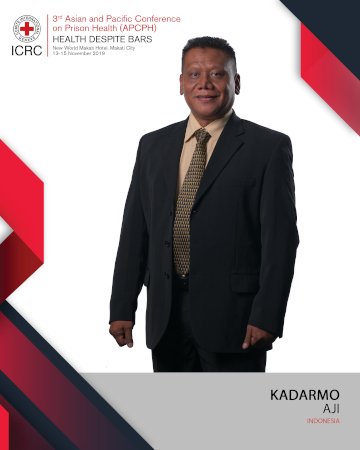
Dr D. Aji Kadarmo
Presentation: Police Prison Health in IndonesiaTime: 14:30 – 15:15
Dr D. Aji Kadarmo is the chief of Police Medicine Unit of Yogyakarta police province and head of Forensic Medicine and Medicolegal of INP Bhayangkara Hospital, Yogyakarta. Dr Kadarmo graduated in medicine from Trisakti University and Department of Forensic Medicine and Medicolegal, University of Indonesia and has a Diploma in Forensic Medicine from Groningen University.
He has worked as head of Indonesian National Police in Bhayangkara Hospital of Sidoarjo, East Java and Police Medicine Unit at INP headquarters, West Java police province, Jakarta metropolitan province police and Yogyakarta province police.
He has supported police medicine in operational police activities such as under-custody police prison health, field health care, medical aspect crime scene processing, food security, disaster victim identification, narcotics screening etc.
Dr Kadarmo is an active member of the Disaster Victim Identification Indonesian team as coordinator and specialist. He has co-authored two international publications in Forensic Science International Journal.
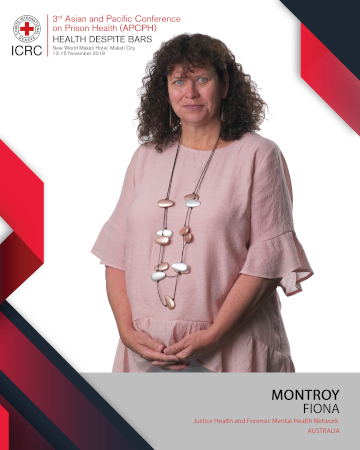
Fiona Montroy
Presentation: Hepatitis in Prison Elimination Programme: A Justice Health and Forensic Mental Health Network InitiativeTime: 15:45 – 16:30
Fiona Montroy is a clinical nurse consultant, sexual health/hepatitis: special projects. She has been a registered nurse in Australia for almost 30 years and started working with the Justice Health and Forensic Mental Health Network in 2013. It is an opportunity that changed the trajectory of her career from critical care to public health. Montroy finds her current role extremely interesting and rewarding as it enables her to help some of society’s most vulnerable and disadvantaged people access health care.
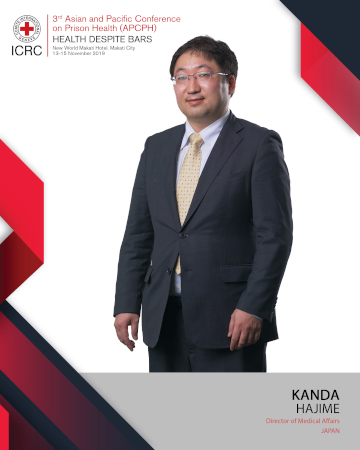
Dr Hajime Kanda
Presentation: Prevention Against Infectious Diseases in Penal Institutions in JapanTime: 16:30 – 17:15
Dr Hajime Kanda is the director of Medical Affairs Division of Chiba Prison. He graduated in medicine in 1996 and soon after worked for a few months as a medical technical officer in the Ministry of Health and Welfare of Japan, Policy Planning Division of Health and Medical Bureau. In the same year, he started his specialization in endocrinology in Kobe University Hospital. In 1997 he joined the Gastroenterology Department at Hyogo Medical Center for Adults and in June 2004 started working in detention-related activities as a doctor in Kobe Prison. In 2007, Dr Kanda participated in the Human Frontier Science Program as a long-term fellow, Yale University School of Medicine and became an associate research scientist there in 2010. In September 2013, he became the chief of Medical Affairs Section in Kyoto Detention House.
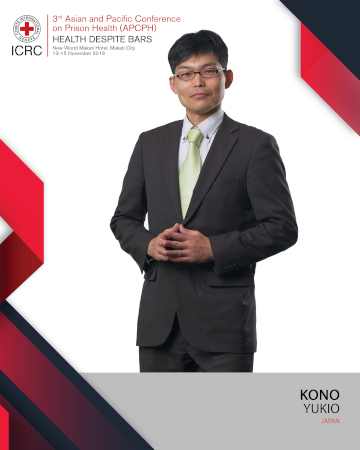
Yukio Kono
Presentation: Prevention Against Infectious Diseases in Penal Institutions in JapanTime: 16:30 – 17:15
Yukio Kono has studied International Cooperation in the correction field and believes that a good prison system can rehabilitate people. He started work in detention-related activities in 2001 as a prison officer in Kushiro Prison and in 2004 became an official in the Public Security Division, Criminal Bureau of the Ministry of Justice. This was followed by a position in the Prison Service Division, Correction Bureau of Ministry of Justice in 2006. Kono later worked in Fuchu prison and Sapporo regional correction headquarters. In 2017, he took over as Chief Supervisor of International Affairs Division in Yokohama Prison and currently holds the position of Government Official of Medical Care Division, Correction Bureau of the Ministry of Justice of Japan.
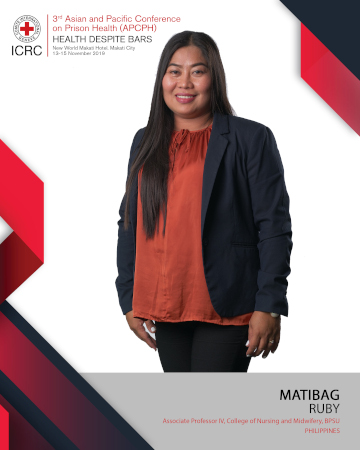
Ruby Santos-Matibag
Presentation: Reproductive Health Beyond Bars: Threat of HIV in Bataan District JailTime: 17:15 – 18:00
Ruby Santos-Matibag is dean of the College of Nursing and Midwifery at the Bataan Peninsula State University where she also serves as a professor and clinical instructor. She has a double degree in Nursing and Midwifery, a Master of Arts in Nursing and a doctorate in Education. With a vast experience spanning corporate, clinical and academic nursing, she is an advocate of scientific research on infectious diseases and the health management system of Bataan District Jail in her hometown.

Josefina A. Tuazon
Session: Health Needs of Women and Other Vulnerable Group of DetaineesTime: 10:45 – 11:30
Josefina A. Tuazon is Professor of Nursing at the University of the Philippines Manila College of Nursing (UPCN) and is serving as Programme Head for Research and Graduate Programme Coordinator. Previously she was dean of the same institution and head of the World Health Organization (WHO) Collaborating Centre for Leadership in Nursing Development from 2004 to 2010. Tuazon was appointed to the Commission on Higher Education of the Philippines (CHED) Technical Committee on Nursing Education from 2011-2013. As a founding member, she also headed the Secretariat of the Asia-Pacific Emergency and Disaster Nursing Network (APEDNN) from 2013-2015 and continues to be an active core member.
Tuazon holds leadership positions in various national and international groups. She is the founding president of the Pain and Palliative Nurses Association of the Philippines, board member of the Pain Society of the Philippines, convenor and member of the executive committee of the East Asian Forum of Nursing Scholars, board member of the International Council on Women’s Health Inc, founding president of the University of Philippines Honor Society of Nursing and the Philippine Council for Health Research and Development Scholars Society. She is engaged in research and is panel chair and reviewer for the University of Philippines Manila Research Ethics Board. Tuazon has contributed to the Institution of Ethics Review for student and faculty research and the promotion of evidence-based practice.
As a teacher and educator, Tuazon won the Metrobank Foundation’s (MBFI) “Outstanding Teacher for 2000”, the “MBFI Award for Continuing Excellence in Service (ACES)” in 2009 and also featured in their second volume of “Ten Outstanding Filipino Teachers” in 2012. She was recognized by her alma mater St Theresa’s College Quezon City Alumni Association as “Teresa’s Light Woman of Service in Education” in 2001. She was the University of the Philippines Alumni Association awardee in 2002 and was awarded “Outstanding Professional for Nursing” by the Philippine Professional Regulations Commission in 2008. In August 2019, Dr Tuazon won the “International Nurse Award” by the UP International Nursing and Health Care Forum in California, USA.
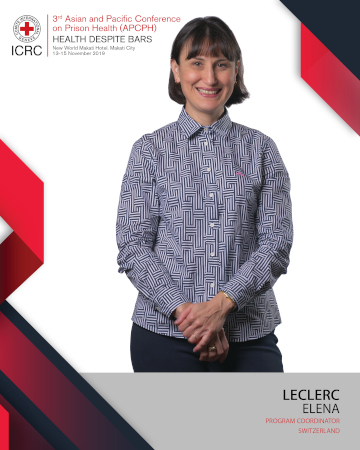
Dr Elena Leclerc
Session: Governance and Leadership for Prison HealthTime: 11:30 – 15:15
Dr Elena Leclerc is the coordinator of Health Care in Detention programme at the International Committee of the Red Cross (ICRC) headquarters in Geneva. She holds a postgraduate degree in infectious diseases and tropical medicine from The London School of Hygiene & Tropical Medicine. Recently, she completed an advanced study in Humanitarian Leadership and Management. Dr Leclerc joined the ICRC in 1998 in Azerbaijan and has since worked in Afghanistan, Rwanda, Haiti, Democratic Republic of the Congo, Israel and the occupied Palestinian territory, Cambodia, the ICRC headquarters and more recently in Thailand. Dr Leclerc has written and contributed to the development of thematic ICRC guidelines and manuals like the practical guide and tools kit published in 2017, Health Systems and Needs Assessments in Prisons. She also co-organizes and lectures for several postgraduate courses in Health Care in Detention at the Swiss Tropical and Public Health Institute in Switzerland, the Grenoble Institute of Political Studies and Centre Hospitalier Universitaire in France and Thammasat University in Thailand.
Dr Leclerc is a member of the WHO/Europe Health in Prisons Steering Group as well as Worldwide Prison Health Research and Engagement Network (WEPHREN) Steering Committee. She has initiated and coordinated the work of the scientific and organizational committee of the Asian and Pacific Conference on Prison Health over the last three years.
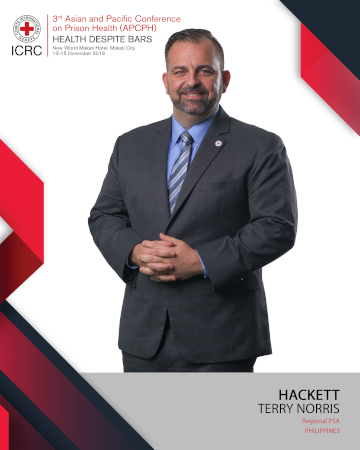
Terry Norris Hackett
Session: Governance and Leadership for Prison HealthTime: 11:30 – 15:15
Terry Hackett is the ICRC’s regional prison system adviser based in the Philippines and also covering Malaysia and the Pacific. He has been working in the corrections sector for over 23 years and retired from the Correctional Service of Canada (CSC) in 2017 as Assistant Deputy Commissioner of Correctional Operations (Pacific). Over his career with CSC, Hackett held various positions including Director of Operations (Pacific) and warden of three different institutions.
Before joining the ICRC, he worked in Kenya, Afghanistan and Rwanda in the area of correctional reform and was the lead consultant for the United Nations Office on Drugs and Crime’s Nelson Mandela Rules e-learning course and the soon-to-be-released Nelson Mandela Rules Handbook for front-line prison staff. Hackett holds an MA in Human Security and Peacebuilding from the Royal Roads University (RRU) with a focus on rule of law and post-conflict correctional reform. His work on international correctional reform and the role of civil society has been published in the South African Journal of Criminology (2015) and the ICPA Journal Advancing Corrections (2017).
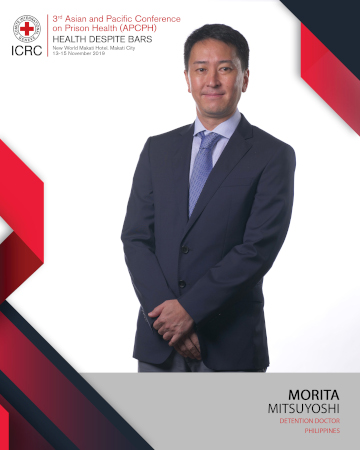
Dr Mitsuyoshi Morita
Session: Communicable Diseases in PrisonsTime: 15:45 – 18:00
Dr Mitsuyoshi Morita is the ICRC detention doctor in the Philippines. He holds a postgraduate degree in Public Health and is currently pursuing a Master of Science in Global Health Policy with the London School of Hygiene & Tropical Medicine. Dr Mitsuyoshi joined the ICRC in 2015 as a detention doctor and has worked previously in Myanmar, El Salvador, Honduras and Panama.
Before joining the ICRC, he has worked for 7 years in several countries in Africa and Middle East as part of teams handling medical emergencies like outbreaks of Ebola in Sierra Leone, cholera in Zambia and meningitis in India, conflicts in South Sudan, Yemen, Syria and malnutrition crises in Somalia and Niger.
Some of his studies and work in the public health field have been published as reports in Public Health Journal (2008) and Nikkei Medical Online (2013), among others.
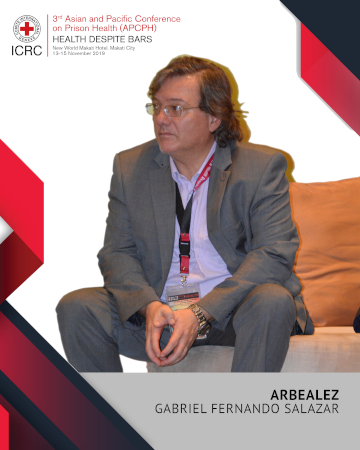
Dr Gabriel Fernando Salazar Arbealez
Session: Communicable Diseases in PrisonsTime: 15:45 – 18:00
Dr Gabriel Fernando Salazar Arbealez is the health coordinator with the ICRC, currently based at the Manila delegation. He is a medical doctor originally from Colombia, with a medical diploma from Mexico, University of Monterrey. He has a master’s degree in Public Health from the Johns Hopkins University, a diploma in Humanitarian Assistance and Disaster Management also from the Johns Hopkins University, diplomas in Tropical Medicine and Travel Medicine from the London School of Tropical Medicine and a diploma in Health and Human Rights from the Harvard University.
As a doctor and humanitarian worker, Dr Arbealez has worked in more than 40 countries over a period of 28 years and has developed an expertise in the implementation of health programmes during conflict situations, natural disasters and complex emergencies.
Moreover, he has academic experience as a professor in Public Health faculties and has contributed to researches and publications in the field of disaster management and response. Dr Arbealez has been working with the ICRC since 2002.
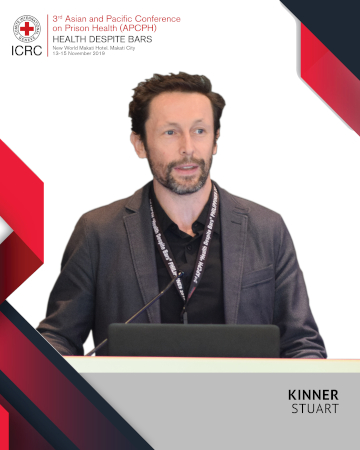
Stuart Kinner
Session: Health Information Systems in PrisonsTime: 08:30 – 17:00
Professor Stuart Kinner is the head of the Justice Health Unit at the University of Melbourne, the Murdoch Children’s Research Institute, and is a visiting professor at the University of British Columbia. His research focuses on the health of adolescents and adults who have contact with the criminal justice system. Kinner is the chair of the WHO Health in Prisons Programme Technical Expert Group and Australia’s National Youth Justice Health Advisory Group. He co-chairs the research committee in the Academic Consortium on Criminal Justice Health and co-convenes the Justice Health Special Interest Group in the Public Health Association of Australia. Kinner serves on the Steering Committee for the Worldwide Prison Health Research and Engagement Network (WEPHREN), is a member of the WHO Steering Group on Prison Health and leads the Health Theme in the UN Global Study on Children Deprived of Liberty.
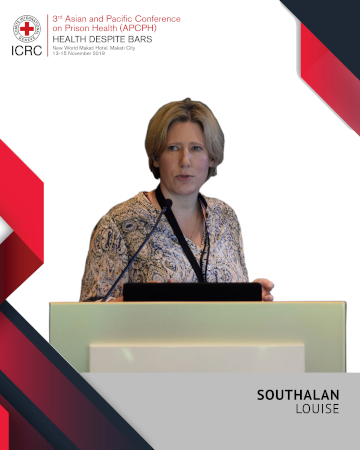
Louise Southalan
Session: Health Information Systems in PrisonsTime: 08:30 – 17:00
Louise Southalan works on prison health reform in the Western Australian Department of Justice as Assistant Director, Strategic Prison Projects, and as a researcher with the Justice Health Unit in the University of Melbourne’s School of Population and Global Health. In 2019 she undertook a Churchill fellowship, looking at ways in which national agencies can best support sub-national prison mental health services and was a Michigan Grotius research fellow at the University of Michigan Law School looking at prison health systems. She is a member of the WEPHREN Steering Committee and monitors conditions in immigration detention centres for the Australian Red Cross. Southalan is also on the board of an NGO that provides hepatitis treatment and education and is an honorary fellow in the Law School of the University of Western Australia.

Jesse Young
Session: Health Information Systems in PrisonsTime: 08:30 – 17:00
Jesse Young is a research fellow in the Justice Health Unit at the University of Melbourne and a senior research officer at the Murdoch Children’s Research Institute. He also holds adjunct appointments in the School of Population and Global Health at the University of Western Australia and the National Drug Research Institute of Curtin University. Specializing in psychiatric epidemiology and data linkage methodology, his research focuses on the health of those who experience social exclusion. Young is a member of the Australian Institute for Health and Welfare’s National Prisoner Health Information Committee and Technical Expert Group, guiding the world-leading surveillance system for health of justice-involved adults in Australia. He is also a member of the Justice-involved Young People Network Advisory Group. Since 2014, he has authored 37 peer-reviewed publications in leading international journals including The Lancet Public Health, BMJ Open, Injury Prevention and Epidemiologic Reviews.
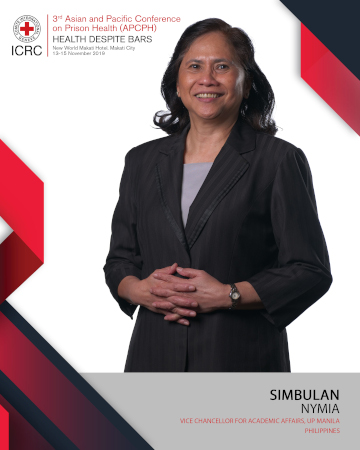
Nymia Pimentel Simbulan
Session: Protecting Dignity and Health: Role of health professionals in prisonsTime: 08:30 – 11:30
Nymia Pimentel Simbulan is a professor of behavioural science and vice-chancellor for Academic Affairs at the University of the Philippines Manila. She is the executive director of PhilRights, which is part of the Philippine Alliance of Human Rights Advocates. She also serves as the vice-president of Positive Action Foundation Philippines Incorporated and is on its Board of Trustees. Simbulan is a recipient of the “Most Distinguished Human Rights Defender Award” by Amnesty International Philippines. Simbulan was the past chairperson of the Department of Behavioural Sciences of the College of Arts and Sciences of the University of the Philippines Manila.
She has a doctorate in Public Health. Her research focuses on public policy, human rights and social policy. She has authored and co-investigated many papers including “Sex work and its associations with alcohol”, “Methamphetamine use among female bar and spa workers in the Philippines”, “Knowledge, attitudes and related practices of Filipino seafarers regarding cardiovascular diseases”, "Condom negotiations among female sex workers in the Philippines: Environmental influences”, “A human rights-focused HIV intervention for sex workers in metro Manila, Philippines: evaluation of effects in a quantitative pilot study” and “The Manila declaration on the drug problem in the Philippines”.
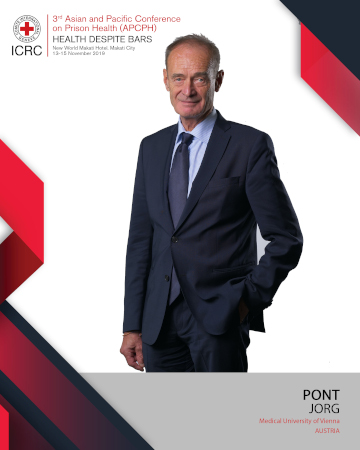
Dr Jörg Pont
Session: Protecting Dignity and Health: Role of Health Professionals in PrisonsTime: 08:30 – 11:30
Dr Jörg Pont serves as a consultant to international organizations for prison health care and medical ethics in prisons. He was born in 1944 in Austria and studied medicine at the University of Vienna. He completed his postdoctoral training in internal medicine, haematology and oncology.
Dr Pont retired as Chief of the Outpatient Department of Kaiser Franz-Josef-Spital in Vienna and Professor of Medicine, Medical University of Vienna. He also worked as part-time prison physician at Justizanstalt Favoriten in Vienna and medical adviser to the Austrian Federal Ministry of Justice.
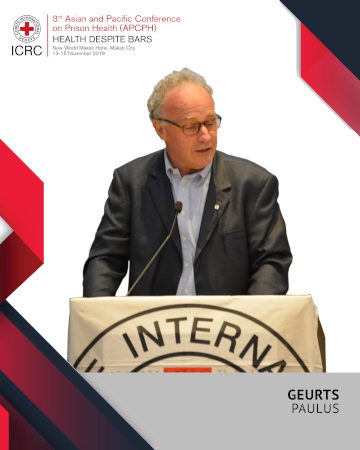
Paulus Geurts
Session: Protecting Dignity and Health: Role of Health Professionals in PrisonsTime: 08:30 – 11:30
Paulus Geurts is a prison systems adviser with the ICRC, currently based in Yangon, Myanmar. Born in Netherlands in 1956, he holds a bachelor’s in Social Work. After a short career as social worker, he spent four years in Malawi in charge of an orthopaedic workshop at the Malawi Central Prison.
After his return to the Netherlands, Geurts joined the Correctional Institutions Agency of the Netherlands in a middle management position. From 1995-2007, he served as prison director, managing high and low security prisons, a female prison and a juvenile/open prison.
From 2007-2011, he was Director of International Cooperation for the Dutch Prison Service, during which time he developed and implemented bilateral prison reform projects in Eastern Europe, Africa and the Caribbean.
Before joining the ICRC in 2013, he was seconded to the UN as Prison Systems Adviser in South Sudan. With the ICRC, Geurts has worked in Eastern and Southern Africa.
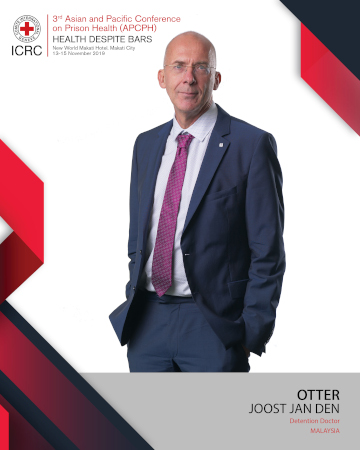
Dr Joost Jan Den Otter
Session: Protecting Dignity and Health: Role of Health Professionals in PrisonsTime: 08:30 – 11:30
Dr Joost Jan den Otter graduated from Free University Amsterdam in 1987 and did his training in Family Medicine from the Department of Public Health and Primary Care of Leiden University. He was registered in 1991. Dr Jan den Otter furthered his research skills at Erasmus Medical School Rotterdam and received a master’s in Clinical Epidemiology in 1995. In 2004 he graduated as a public health specialist from the Netherlands School of Public and Occupational Health. He was awarded a Ph.D. at the Radboud University in Nijmegen for research in monitoring asthma and chronic obstructive pulmonary diseases in primary care in 2005.
Dr Jan den Otter has been working in primary care sector, both in the community as well as in prison health settings. After his registration as a public health specialist, he continued to serve government prison health services in the field as well as at the headquarters. For several years he worked as a senior consultant at Pharos, a knowledge institute on migration and health. He also managed an innovative community mental health team addressing the needs of youth with severe mental health issues. He volunteered for and even chaired the Johannes Wier Foundation, an NGO in his home country. In 1993 he joined as a base camp physician for the first Dutch expedition to the K2 mountain in Pakistan.
In 2010, Dr Jan den Otter started working in Copenhagen as clinical director of the International Rehabilitation Council of Torture Victims, an umbrella organization for 150 torture rehabilitation centres all over the world. He has also been the editor of Torture Journal: Journal on Rehabilitation of Torture Victims and Prevention of Torture. He is a member of the World Psychiatric Association’s sections on Forensic Psychiatry and Psychological Consequences of Torture and Persecution. In 2014 Dr Jan den Otter joined the ICRC and has been working in different assignments as a medical doctor.

Dr Elena Leclerc
Session: Defining recommendations or declarations from this conferenceTime: 14:00 – 17:00
Dr Elena Leclerc is the coordinator of Health Care in Detention programme at the International Committee of the Red Cross (ICRC) headquarters in Geneva. She holds a postgraduate degree in infectious diseases and tropical medicine from The London School of Hygiene & Tropical Medicine. Recently, she completed an advanced study in Humanitarian Leadership and Management. Dr Leclerc joined the ICRC in 1998 in Azerbaijan and has since worked in Afghanistan, Rwanda, Haiti, Democratic Republic of the Congo, Israel and the occupied Palestinian territory, Cambodia, the ICRC headquarters and more recently in Thailand. Dr Leclerc has written and contributed to the development of thematic ICRC guidelines and manuals like the practical guide and tools kit published in 2017, Health Systems and Needs Assessments in Prisons. She also co-organizes and lectures for several postgraduate courses in Health Care in Detention at the Swiss Tropical and Public Health Institute in Switzerland, the Grenoble Institute of Political Studies and Centre Hospitalier Universitaire in France and Thammasat University in Thailand.
Dr Leclerc is a member of the WHO/Europe Health in Prisons Steering Group as well as Worldwide Prison Health Research and Engagement Network (WEPHREN) Steering Committee. She has initiated and coordinated the work of the scientific and organizational committee of the Asian and Pacific Conference on Prison Health over the last three years.

Josefina A. Tuazon
Session: Defining recommendations or declarations from this conferenceTime: 14:00 – 17:00
Josefina A. Tuazon is Professor of Nursing at the University of the Philippines Manila College of Nursing (UPCN) and is serving as Programme Head for Research and Graduate Programme Coordinator. Previously she was dean of the same institution and head of the World Health Organization (WHO) Collaborating Centre for Leadership in Nursing Development from 2004 to 2010. Tuazon was appointed to the Commission on Higher Education of the Philippines (CHED) Technical Committee on Nursing Education from 2011-2013. As a founding member, she also headed the Secretariat of the Asia-Pacific Emergency and Disaster Nursing Network (APEDNN) from 2013-2015 and continues to be an active core member.
Tuazon holds leadership positions in various national and international groups. She is the founding president of the Pain and Palliative Nurses Association of the Philippines, board member of the Pain Society of the Philippines, convenor and member of the executive committee of the East Asian Forum of Nursing Scholars, board member of the International Council on Women’s Health Inc, founding president of the University of Philippines Honor Society of Nursing and the Philippine Council for Health Research and Development Scholars Society. She is engaged in research and is panel chair and reviewer for the University of Philippines Manila Research Ethics Board. Tuazon has contributed to the Institution of Ethics Review for student and faculty research and the promotion of evidence-based practice.
As a teacher and educator, Tuazon won the Metrobank Foundation’s (MBFI) “Outstanding Teacher for 2000”, the “MBFI Award for Continuing Excellence in Service (ACES)” in 2009 and also featured in their second volume of “Ten Outstanding Filipino Teachers” in 2012. She was recognized by her alma mater St Theresa’s College Quezon City Alumni Association as “Teresa’s Light Woman of Service in Education” in 2001. She was the University of the Philippines Alumni Association awardee in 2002 and was awarded “Outstanding Professional for Nursing” by the Philippine Professional Regulations Commission in 2008. In August 2019, Dr Tuazon won the “International Nurse Award” by the UP International Nursing and Health Care Forum in California, USA.
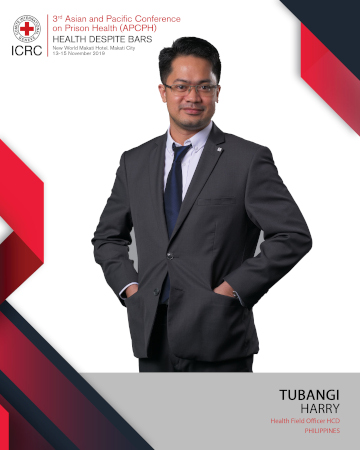
Harry Tubangi
Session: Defining recommendations or declarations from this conferenceTime: 14:00 – 17:00
Harry Tubangi is a health field officer with the ICRC in Manila. As manager of the Health Information System being run by the ICRC in detention facilities, he works with the authorities to strengthen the health-care system catering to the detainees in the Philippines.
Tubangi was instrumental in organizing the 1st Health Care in Detention Course in Manila. He works closely on the deployment strategies for health workers in jails and the health facility planning standards in detention places. He has a bachelor’s degree in Philosophy and a Bachelor of Science Degree in Nursing.
Before pursuing his passion for public health, Tubangi had a clinical practice at the Philippine General Hospital, where he worked for eight years. He completed the Detention Health Course at the Thammasat University in Bangkok, Thailand, and the Health Emergency in Large Population Training at the Kyushu University, in Fukuoka, Japan. He is now writing a paper on Health-Informed Criminal Justice Policy Reforms to complete his degree in Health Policy Studies from the University of the Philippines.

Dr Losavati Wilbur Daugunu
Presentation: Providing Psychiatric Care in a Resource Limited Prison Health SystemTime: 09:00 – 09:45
Dr Losavati Wilbur Daugunu is a psychiatrist with 21 years of working experience as a general practitioner, psychiatrist and a clinical manager. At present, Dr Daugunu is CEO of Laloki Psychiatric Hospital, the only full-fledged psychiatric hospital in Papua New Guinea (PNG).
She graduated from the University of PNG in 1998 and also acquired a Bachelor of Science from University of South Pacific, Fiji. In 2003, she obtained a postgraduate diploma in obstetrics and gynaecology from the University of PNG. Dr Daugunu did her psychiatry residency at the same university and graduated with a Master in Medicine (Psychiatry) in 2012. Currently she is pursuing a master’s degree in addiction science offered as an integrated course by Virginia Commonwealth University, King College and Adelaide University.
Dr Daugunu has numerous certificates in her portfolio including certificate of Clinical Observership in Psychiatry from New South Wales Institute of Psychiatry, certificate of completion of New South Wales Health Suicide Risk Assessment and Management, Primary Mental Health Care Training certificate in Port Moresby and certificate of attendance at the World Psychiatric Association International Congress (2007, Melbourne, Australia).
She is a member of several professional organizations including PNG Doctors Association, Medical Society of PNG, PNG psychiatric association, World Psychiatric Association, Australia, New Zealand Mental Health Society, ASEA Federation for psychiatry and mental health and International Society of Substance Use Professionals.
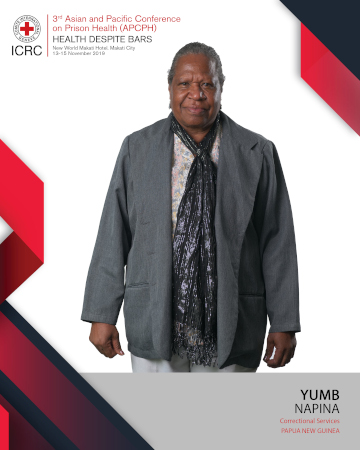
Napina Yumb
Presentation: Providing Psychiatric care in a Resource Limited Prison Health SystemTime: 09:00 – 09:45
Napina Yumb is a registered nurse holding diplomas in midwifery and BCN (psychology, biopsychology, cognition and neuroscience) as well as a diploma in government management and DCS–PNG Correction.
Yumb worked in the Department of Health for 13 years. In 1990 she started working for the PNG Correctional Service and served as a health coordinator at the Correctional headquarters from 2011-2014.
Since 2015, Yumb has taken over as Director of Health Services, PNG Correctional Services. She coordinates all health activities for 21 correctional institutions throughout the country.
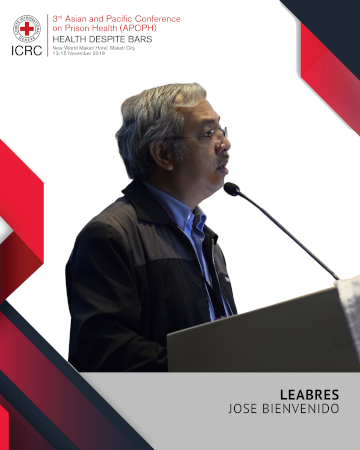
Dr Jose Bienvenido Leabres
Presentation: Dangerous Drug Abuse Prevention and Treatment Programme in the PhilippinesTime: 09:45 – 10:30
Dr Bienvenido Leabres is the programme manager of the Dangerous Drugs Treatment and Prevention Programme of the Department of Health, Philippines. He graduated from De La Salle Medical and Health Sciences Institute, Dasmarinas Cavite in 1993. He became the founding fellow of the Philippine College of Addiction Medicine in 2005. Dr Leabres has been the chairperson of the rehabilitation programme, OIC-administrator and head of medical services of the Drug Treatment and Rehabilitation Centre in Tagaytay and Bicutan cities.
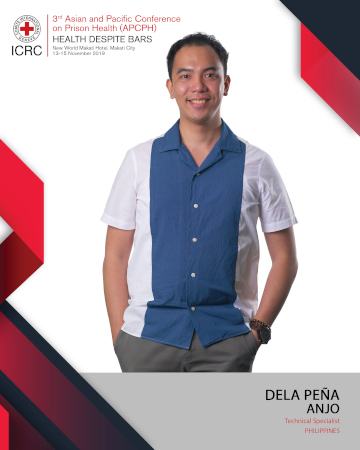
Anjo Dela Peña
Presentation: Dangerous Drug Abuse Prevention and Treatment Programme in the PhilippinesTime: 09:45 – 10:30
Anjo Dela Peña is the senior health programme officer in the office of the Under-secretary for Health Facilities and Infrastructure Development. He is part of the team that crafted the landmark legislation, Universal Health Care Act and provided pieces of evidence in support of Health Impact Assessment and Health Technology Assessment.
In 2014, Peña served as the team lead for the conditional cash transfer programme and in another national government agency during the Typhoon Haiyan. He holds degrees in nursing and a master’s in health social sciences. He is a recipient of the Ford Foundation International scholarship.
.jpg)
A. YUSPAHRUDDIN
Presentation: Drug Rehabilitation and Related Infectious Disease ComorbidityTime: 11:00 – 11:45
A. Yuspahruddin is the Director of Health Care and Rehabilitation in the Directorate General of Corrections, Ministry of Law of the Republic of Indonesia. He graduated from the Correctional Academy of Indonesia in 1984 and earned a bachelor’s degree in law from the University of Bengkulu in 2002 and a master’s degree from University of Indonesia in 2007.
In the correction system of Indonesia, he has worked as head of Salemba Prison in Jakarta from 2011-2013 and head of Correction Division of regional office, Ministry of Law and Human Rights Bengkulu, Middle Java and Jakarta from 2013-2017.
Yuspahruddin was the head of regional office of the Ministry of Law and Human Rights ACEH from 2017-2018, following which he took on the role of director of Secure and Order & director of Detainee Service and State Seizure Goods and then as director of Health Care and Rehabilitation.
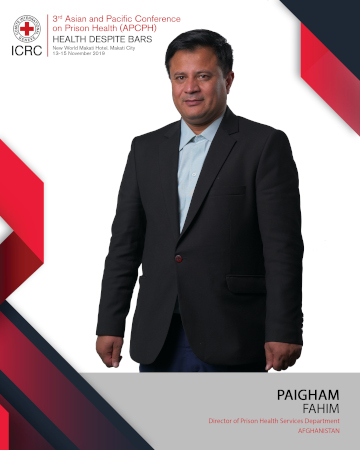
Dr Fahim Paigham
Presentation: Methadone Substitution Therapy in Prisons of AfghanistanTime: 11:45 – 12:30
Dr Fahim Paigham is director of Prison and Juvenile Health and coordinator of National NCDI (non-communicable diseases and injuries) Commission, Ministry of Public Health, Afghanistan. He is also the chairman of Afghan Youth Social Movement and aims to focus on social and welfare affairs in Afghanistan.
Dr Paigham studied medicine at the University of Nangrahar, Afghanistan and then acquired a master’s in public health from the London School of Hygiene and Tropical Medicine. In 2011, he founded the NCD Department in the Ministry of Public Health and led the development of first national NCD Prevention and Control Strategy for Afghanistan.
Over the last decade Dr Paigham has been working with regional and international organizations to develop, review and revise policies and strategies relevant to NCDs and HIV/AIDS. He served as director of National AIDS Control Programme in Afghanistan from 2009-20 and led it successfully through the induction of methadone maintenance treatment as a pilot programme in Afghanistan.

Dr Pornpet Panjapiyakul
Presentation: How Thailand is Moving Towards Equivalence of Care for DetaineesTime: 14:00 – 14:45
Dr Pornpet Panjapiyakul graduated in medicine from Khon Kaen University, Thailand, in 1982. He then acquired a bachelor’s degree in occupational health from Sukothai Thamathirath University followed by a master’s degree in medical epidemiology.
From 2004-2018, Dr Panjapiyakul worked with the Thai Ministry of Public Health (MoPH) as deputy director in the Health Administration Division. His main responsibilities were related to health system development in the Office of the Permanent Secretary. He is now retired but continues to advise the MoPH as Health Administration expert.
Following the recommendations made by the National Human Rights Office of Thailand to the Thai cabinet in November 2015, Dr Panjapiyakul was instrumental in crafting and implementing the Thai Prison Health Policy and System. This framework involves the Department of Corrections from the Ministry of Justice, Office of the Permanent Secretary, the Department of Disease Control from the Ministry of Public Health and the National Health Insurance office.

Dr Mardy L. Lee
Presentation: International Standards for Prison Health Care: The San Ramon Prison and Penal Farm SODIS Project ExperienceTime: 14:45 – 15:30
Dr Mardy L. Lee is the chief of hospital at the San Ramon Prison and Penal Farm Infirmary under the Bureau of Corrections, Philippines. He holds master’s degrees in public health and in development management. Dr Lee won the Innovative Capstone Research award for tackling safe water through solar disinfection for people deprived of liberty. Dedicated to serving the country, he provides medical services in the rural areas of Mindanao.
Dr Lee’s passion for learning also continues and he is currently enrolled in the Juris Doctor Program of the Western Mindanao State University College of Law.
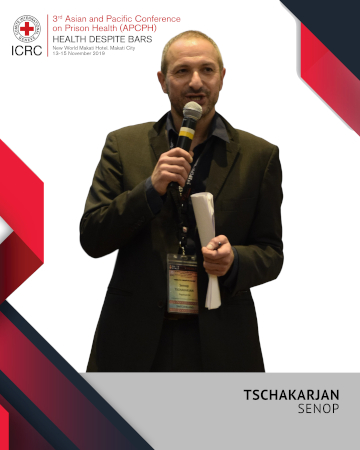
Dr Senop Tschakarjan
Session: Mental Health in Prisons, Drug Addiction Treatment and Harm reduction in PrisonsTime: 09:00 – 12:30
Dr Senop Tschakarjan has been working at the ICRC headquarters since 2015 as a mental health adviser/specialist with a focus on detention. He is a child and adolescent psychiatrist from Germany.
After finishing medical studies in Bavaria, Dr Tschakarjan moved to Zürich, Switzerland, where he specialized at the University Child and Adolescent Psychiatry Hospital. He spent four years working in different departments of the hospital, including one year in the Child and Adolescent Psychiatric, Forensic Department, where he worked with adolescents in detention and did risk assessments of delinquent adolescents.
Dr Tschakarjan also holds a postgraduate diploma in public health from the London School of Hygiene and Tropical Medicine. As part of his field assignments in various countries he served as the medical coordinator for a pilot methadone substitution program for heroin drug users in Kabul, Afghanistan. This gave him the opportunity to get an inside look at detention facilities. He has also worked in Sudan, Lebanon, Israel and the occupied Palestinian territory and Egypt.
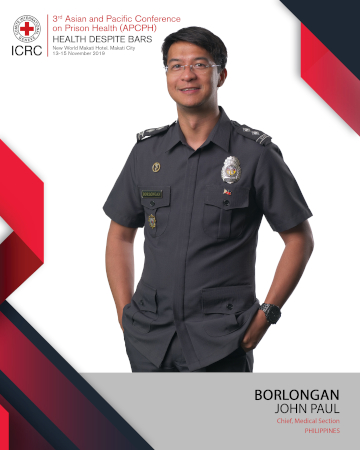
Dr John Paul Borlongan
Session: International Standards for Prison HealthTime: 09:00 – 12:30
Dr James Paul Borlongan is the medical section chief of the National Headquarters Health Service Division and chief health officer for the Central Luzon region and Cagayan Valley region. He is also the roving doctor for the Philippine Bureau of Jail Management and Penology (BJMP) training camp and medical coordinator of the National TB programme.
Dr Borlongan graduated as Bachelor of Science in Biology from De La Salle University Manila and earned a degree in medicine from the University of the East Ramon Magsaysay Memorial Medical Center. He then did orthopaedic training at the Medical City and worked as a general medical practitioner from 2012-2014. Recently, he earned a master’s degree in public administration from the Bulacan State University in the Philippines. Dr Borlongan joined the BJMP in 2014 as a medical officer for the health service.
Adding to his accomplishments, he has completed Health in Detention course from Thammasat University School of Global Health in Bangkok and a course in the management of drug resistant TB in prisons from the TB in Prisons European Center for best practices in Baku, Azerbaijan.